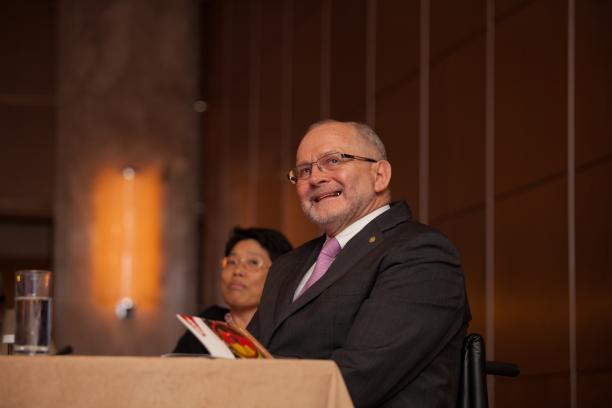No. 31: Sir Philip Craven chosen for another four years
01.12.2013Sir Philip Craven will continue his role as IPC President, though with a new Vice President and a new-look Governing Board.
 Sir Philip Craven has been re-elected as IPC President and will serve a fourth term.
© • George Santamouris
Sir Philip Craven has been re-elected as IPC President and will serve a fourth term.
© • George Santamouris
“In the next four years I’m excited, like the vast majority of the members, if not all the members, by the Agitos Foundation and what that can do for the development of Paralympic sport across the world, creating a new generation of athletes.”
“I’m glad it’s all over,” was the reaction of an exhausted and emotional Sir Philip Craven after his election for a fourth and final term as IPC President at the IPC General Assembly on 24 November.
Having been elected unopposed on the previous two occasions, fellow Governing Board member Alan Dickson stood against Sir Philip this time around, adding a little extra spice to the proceedings.
And, with two other Members at Large – Andrew Parsons and Ann Cody – vying for Vice President, and 24 candidates standing for 10 Member at Large roles, a lot was at stake when IPC CEO Xavier Gonzalez started the roll call ahead of the election.
Tensions were broken by some members confirming their attendance in a variety of ways, however, once the vote started the room fell eerily silent, as 149 members with voting rights determined the Paralympic Movement’s future.
“I’m very happy, very relieved and quite amazed at the support I got,” said Sir Philip, who received 127 votes to Dickson’s 20 and wasted no time in outlining his future aspirations.
“In the next four years I’m excited, like the vast majority of the members, if not all the members, by the Agitos Foundation and what that can do for the development of Paralympic sport across the world, creating a new generation of athletes.
“A lot of my time and my energy will be involved in that and ensuring our members, particularly our members who have just kicked off in Paralympic sport, develop their capacities.
“I think it’s going to be very exciting to maintain the momentum, a phrase I’ve used a lot recently, of the Paralympic Games and our World Championship programmes. We go to so many different cultures with the Games and we have to put on great Games in different cultures.
“We’ve achieved it so far but we have to continue to achieve it in Sochi, Rio, PyeongChang and Tokyo going forward.”
For Parsons, one of the biggest challenges he faced after being elected Vice President was convincing his wife back home in Brazil of the actual result.
“When I phoned her and said 95-52 (the election result for Vice President) she told me to pass on my congratulations to Sir Philip,” explained Parsons.
“I’m thrilled and delighted to be elected Vice President,” he continued. “It shows that the membership trusts you, even if my wife doesn’t always believe what I tell her over the phone.”
New-look Governing Board
Following Athens, the IPC Governing Board now has a new look with only four Members at Large – Rita van Driel, Miguel Sagarra, Patrick Jarvis and Cody – from the previous board being elected to serve another term.
Three new faces were elected in the first round of votes, and all three – South Korea’s Kyung-won Na, Japan’s Yasushi Yamawaki and UAE’s Mohamed Alhameli – are from Asia.
In the second round Kenya’s Jairus Mogalo was elected, as was European Paralympic Committee President John Petersson and New Zealand’s four-time Paralympic swimming champion Duane Kale.
The other two members are IPC Athletes’ Council Chairperson Todd Nicholson and Gonzalez.
Impressive conduct
To those outside the Paralympic Movement, the way the elections were conducted clearly made a positive impression.
Whether it was how the two Presidential candidates shook hands soon after the result or the way all exiting Governing Board members were brought onto the stage by Sir Philip to receive a standing ovation from members, observers left the General Assembly full of praise.
“After controversial and bitterly fought elections in football and cycling in recent years, the IPC, as on the track and field of play, has demonstrated to the sporting world that there’s a consensual, and some might say better, way of conducting business,” wrote the BBC’s Richard Conway, who was in Athens covering the election.



















